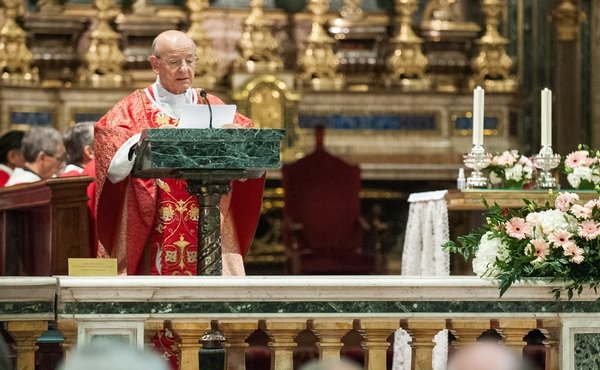The Risen Christ as centre and root of work
“The Risen Christ, who shed his blood, makes Himself present under the species of bread and wine, and gives his peace to us. The disciples were joyful, and we too open ourselves to his peace and joy.” The Prelate of Opus Dei began his homily for the academic opening of the Pontifical University of the Holy Cross in Rome with these words. He went on, speaking about the mystery of the Eucharist: “As St. Josemaria encouraged us to do, let us seek to make the Eucharistic celebration the centre and root of our work; Christ, who shows us his love on the Cross [...]. Thus it will be easier to make this a community of teachers and disciples, joyful and family-like.”
“We are here in Rome, alongside the Pope — whether we've been here for many years or a short time — and the Lord wants to entrust the wonderful task of transmitting the truth to each one of us. That's how the world will be filled with peace,” Msgr. Ocáriz said.
Praying for the Synod
At the end, with the first session of the Synod of Bishops beginning imminently, Msgr. Ocáriz invited the academic community to respond to Pope Francis's invitation and pray intensely for it.
Msgr. Fernando Ocáriz's address at the academic opening of the Pontifical University of the Holy Cross
Msgr. Ocáriz is the Grand Chancellor of the Pontifical University of the Holy Cross, and he inaugurated the institution's 39th academic year by sharing a new goal after the Eucharistic celebration: to “look to the future awaiting us with enthusiasm and hope.”
“Enthusiasm is the attitude of anyone embarking on a new path or stage. [...] At the same time, those who embark on new paths know that there will be difficulties. That is why it is necessary to nurture hope, which means waiting trustfully for God's plans to be realized.”
“Enthusiasm and hope are components of the courage that every new stage of a journey requires,” he went on. “Courage to identify projects that can broaden the university's horizons [...]; courage to make decisions that will impact our future, and for which we need to think about the well-being of the people who will come after us.”
And he concluded: “As St. Josemaria wrote in The Way: 'Add a supernatural motive to your ordinary work and you will have sanctified it.' This is also an incentive to see the extent of the good that work can have, not only for those directly involved but for all of humanity, if we offer it to God.”
